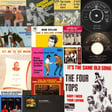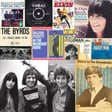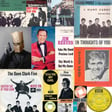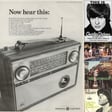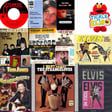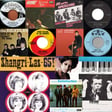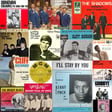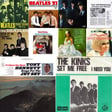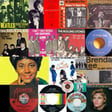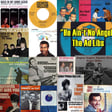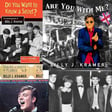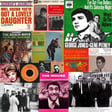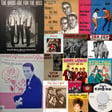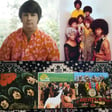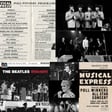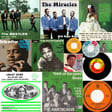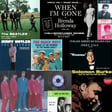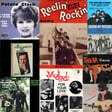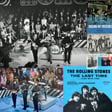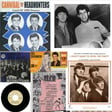Become a Creator today!Start creating today - Share your story with the world!
Start for free
00:00:00
00:00:01

July 1964 (side A)
In addition to our look at the British charts for July of 1964, we feature "Rock and Roll Musicals". From "Jailhouse Rock" to "Summer Holiday", "It's Trad Dad (aka Ring-a-Ding-Rhythm)", through to "A Hard Day's Night" and "Ferry Cross the Mersey". Hint: A certain Beatles song ENTERS the chart at number three. All this, and more Do-Wah-Diddy than you can Diddy-Dum-Diddy-Do to. #madeonZencastr
Recommended
Transcript
Beatles' Mantra and Beginnings
00:00:00
Speaker
the Beatles had this chant John Paul and George and probably then Stuart and Pete had this chant when things weren't going well which in their world wasn't very often because mostly it was an upward trajectory but nonetheless sometimes you know a bad night or the gig we you know didn't work properly or the amps broke or whatever I say where are we going fellas and they'd go to the top Johnny and I say where's that fellas and they say to the top of most of the Papa most I said right and we all sort of Cheer up.
Introduction to July 1964 Feature
00:00:31
Speaker
Where are we going, Johnny? Straight to the top, boys. Oh, yeah, where's that? The top or most of the popper.
00:00:43
Speaker
Welcome to July of 1964 here on top or most of the popper most. This is side eight. We're not going to have four
Impact of 'A Hard Day's Night'
00:00:51
Speaker
sides this time. Hopefully I imagine I'm kiddo tool and I'm Martin Quivel. Our feature this month because July of 1964 was when A Hard Day's Night actually premiered. So it was 60 years ago this month that the world was introduced to both the single and the film A Hard Day's Night. Wow, that is incredible. Of course, the film has often been called the Citizen Kane of Jukebox musicals, and I think that's a pretty accurate description. It still stands up today, just an incredible piece of filmmaking.
00:01:30
Speaker
I think it's timeless as well, even though it is of the time in a way, I think keeping it at that black and white feel and there's something about the film that even though it is that year in 1964, there's still a quality to it that you can watch it today. And it still feels now We're gonna talk a bit about the film and we're gonna talk a bit about the songs in the film and the reception that the Beatles got to it as we get to it. Let's start with the world of rock and
Elvis vs. The Beatles: Musical Films
00:02:01
Speaker
roll musicals in general. We all know about the 50s into the 60s, although you have to say Elvis's early films like Love Me Tender are not the cheesy Elvis Jukebox musicals that we came to know. Love Me Tender in particular, he was doing some serious acting in that movie and it was not Viva Las Vegas, even though that has its charms. And then you have a little bit later Jailhouse Rock, which is my personal favorite with some great choreography
Influence of 'The Girl Can't Help It'
00:02:31
Speaker
in there. but Yeah, I mean, they were very different than the later ones. Yeah. The main rock and roll jukebox musical, I think, is a Girl Can't Help It, which, of course, was one of the Beatles favorites. It featured Little Richard, Jane Mansfield, and in 68, the Beatles would stop the recording of Birthday because it was on television.
00:02:52
Speaker
Yes, there's some corniness to it, but what I liked about that movie is the performances. And Jane Mansfield herself, there's
Jukebox Musicals vs. 'A Hard Day's Night'
00:03:01
Speaker
still a little bit of veginess to it. and I can see why they liked it, because obviously Jane Mansfield was the sex symbol of her day, but you get some great performances from Eddie Cochran, Little Richard. You can just kind of sense the dangerous, sexy side of rock and roll in that film. Yeah, corny parts, corny humor in some cases in it, but it's a good rock and roll movie. And as opposed to what Marv was saying about Hard Day's Night and how black and white really encapsulates what Hard Day's Night is all about, Girl Can't Help It, the whole point was it was widescreen cinemascope and it was in color. That whole opening is just pretty amazing in retrospect.
00:03:43
Speaker
That's one of my favorite bits of film history in some ways is when that happens, he like flicks it to change it to widescreen and then he gets it to go to color. That's just iconic. But that's a formula that the rock and roll movies would repeat again and again and again. It's, okay, let's just come up with as bare a story as possible and squeeze in as many acts as we possibly can within the course of this 90 minutes or so. Yeah, and
Cultural Influence of Rock and Roll Musicals
00:04:11
Speaker
that's probably why one of the many reasons why Hard Day's Night was seen as such a unique and breakthrough film because it didn't do that. It actually did have a story to it. It was a real film. It wasn't just, hey, let's just cram as many acts as we can into 90 minutes.
00:04:30
Speaker
As opposed to the other film, we're gonna talk at least to some extent about the Jerry and the Pacemakers end of 64 film, Fairy Across the Mersey, which is kind of a hybrid between the Hard Day's Night model and the Girl Can't Help It model. It's still an interesting watch. We'll talk about it. The next film I think we want to at least speak a little bit about, we've spoken about really quite a bit over the past year, particularly in regards to Helen Shapiro. It's Tradd Dad, or as it's known here in the States, Ring-a-Ding Rhythm. which I still love. I prefer the American title. Really? Again, it's one of those sort of cash box or billboard review type phrases. It's ring-a-ding rhythm. Yes.
00:05:13
Speaker
The plots such as it is, I like to compare it to all those Animal House knockoffs we got in the mid to late 80s. It's like, oh, you got the kids that are having to find some way to go out and have fun. And how do they have fun? They go to all these clubs and there are all these bands in all these clubs. Wow.
00:05:34
Speaker
What's fascinating about this movie, first of all, the director, Richard Luster, we know him, but it's kind of a mishmash of all different genres because, of course, in England, it's trad dad. Of course, we've talked many times
The Beatles' Film Decisions
00:05:51
Speaker
on our show about trad jazz. which was huge in England, and there are indeed trad jazz bands that appear in this, but they are also throwing in American rock and roll like Chubby Checker. You know, he appears in this. Then, of course, you get British pop stars of the day, one of the stars, Helen Shapiro.
00:06:13
Speaker
So it's just kind of fascinating that even though you think in the title you're going to get a lot of trad jazz in there and you do you get some but as I said it's a mishmash of American rock and British pop and some trad jazz so it's a bit of everything they're trying to appeal to as wide an audience as they can. A minimal plot and very definitely in the mode of girl can't help it. Do you think they had the mix of acts from both sides of the pond so that they could get the audience from both sides of the pond? Yeah, that's probably it. Also, by calling it Ring-a-Ding rhythm in America, I mean, trad jazz probably, a lot of American teenagers particularly would say, what does that mean? So Ring-a-Ding rhythm, hey, we American teenagers, we get that.
00:07:02
Speaker
yeah cats that's right cats Yeah, it still sounds a bit like adults trying to make up a title that's good for the kids. Yeah, exactly. Yeah,
Crafting 'A Hard Day's Night'
00:07:11
Speaker
that's hip. That sounds like those kids will get it. It's like Mark says in a little sign off here, topper most of the popper most, a term coined by an older crowd trying to appeal to the teenagers. Yeah, exactly. He's one of those phrases that someone, an older person who doesn't understand teenagers comes up with a slogan that they think is going to be the hip slogan of the month. Okay, so the next year we got Cliff Richard's summer holiday, which to be honest, I've seen it. I don't know that much about it. Marv, tell us about it. Take it away. It's a film.
00:07:53
Speaker
ah Well, in terms of where it kind of fits in in these rock and roll musicals between the Elvis and the what are genuinely jukebox musicals and then what's coming. It's probably a bad advertisement in a way, but I've always seen Summer Holiday as almost like an early version of Magical Mystery Tour in a sense. where it's about people going away on a holiday or on a trip together, and then somehow or another they fit musical numbers around the bare bones of an attempt at a story which is just people going away on holiday. How much of Cliff has actually featured singing? I think there's either eight or ten songs in there and then the they built an album around it.
00:08:35
Speaker
But saying that, I mean, you're not just got Cliff Richard songs. I think in those eight or ten songs, I think you've got four or five, just the shadows playing in the background while things are going on as well. And it was a huge hit in England in 63, only second to From Russia With Love. wow And it was released in America, but it flopped partially because it was released only two days after the assassination of JFK.
00:09:05
Speaker
So really bad timing. But I also think it may have also been kind of a cultural thing, kind of like Magical Mystery Tour, the whole concept of the bus tour. That's not exactly an American thing. And so that may have been part of the problem. Also, of course, Cliff Richard was not a big star in the U.S. like he was in the UK. And Paul McCartney would frequently comment on that when talking about how they got to a Hard Day's Night. It's like, you know, we knew that Summer Holiday, which was a big hit over here, went to the States and just flopped and we weren't going to do that. Although I've seen a number of drive-in movie advertisements, and you know, in the days of double features. And they often put Hard Day's Night together with Summer Holiday. Oh, they did. I didn't know that. That must have made Cliff really happy.
00:10:01
Speaker
ah So what Paul McCartney was commenting to was their first offer for a feature film, the somewhat racially titled Gutter Girls, also known as the Yellow Teddy Bears. ah Very briefly, the
Capturing the Beatles' Lifestyle
00:10:21
Speaker
script for this film was apparently that a clique of girls in an English school wear small yellow teddy bears on their uniforms to signify when they have lost their virginity. Linda, the girl's leader, fears she may be pregnant from her window cleaner boyfriend Kinky, an aspiring top singer.
00:10:41
Speaker
great idea they tried to sign the Beatles they said nope we don't need any of your songs we're gonna give you six songs we want you to perform for this film and and give us a soundtrack i don't even want to know what the titles would have been what could have possibly gone wrong Brian had no interest in this. The Beatles had no interest in this. They had seen what went down with summer holidays. Like, no, if we're going to do a film, we want to do a film that we like at least a bit like the early Elvis films and a bit like girl can't help it. We want energy and we want a nice interesting film for our fans.
00:11:21
Speaker
somewhat family friendly and this wasn't it. Oh, the film did actually get made, by the way. I don't know who the group is that's in it, but the gutter girls does actually exist. Are you serious? No way. Yes. We've got to find it. So after they turned down the yellow teddy bears or gutter girls, we basically know the story. United artists had found a loophole in the contract with capital, not with EMI, but with capital where they could release soundtracks in the United States. So they signed up the Beatles in October of 1963
Timelessness of 'A Hard Day's Night'
00:12:01
Speaker
for their first feature. Hmm.
00:12:04
Speaker
Why? And that's, of course, before they ever hit the States, which is just amazing. I mean, how quickly this all happened. Although, I guess, maybe not quite that amazing because these Jukebox musicals, as we've been talking about, were already a phenomenon. And I think when talked about, I mean, there was no thought that A Hard Day's Night was going to become this incredible classic. You know, these films were just thought of as all with these quick money makers. These bands weren't going to last, so this was just another way to sell some music, sell some records, and of course movie tickets, another way to just cash in.
00:12:43
Speaker
Well, Walter Jensen has told us on any number of occasions what United Artists told to him was, all we need is a film for the express purpose of getting a soundtrack album. That's right. Just make sure there are enough new songs for a soundtrack album and don't go over budget, which is really part of the reason why it was in black and white. Exactly. how the world has changed because you're filming black and white now and it costs more money. Now it's the same because it's just you're just flipping a switch on your camera. That's true, digital. You no longer have to buy black and white stock to get good black and white these days. The interesting and amazing thing about this is, yes, United Artists did get their soundtrack album. However, Capitol would release all eight of the new Beatles tracks on their own releases, seven on singles and five on the Something New album.
00:13:34
Speaker
Wow. Although UA did get the ah George Martin instrumentals, which have lasted better and longer than we might have imagined. That is true. And some of them were released as singles. We'll come across one. In this episode, yep. That's right. Or in this show. Maybe not part A here, but... Yep, but we will in the near future. So by November, they had hired screenwriter Alan Owen and Alan Owen went out and followed the Beatles around for three days. And it's amazing that it was only three days because he did a pretty good job of capturing their language, their slang. And as we know that one great line in the film was spoken by Paul's grandfather, you know, a car in a room and a room and a room and a room, you know,
00:14:24
Speaker
I mean, he really captured that obviously sanitized version of them about their lives, but that's what they were living at that time. Touring and so forth. Did a pretty good job. Well, I mean, all one need do is look at the Maisel Brothers documentary footage. You can't get much closer to a real life Hard Day's Night than what's going on there as they travel across the states. I always thought that one of the good things about the script was the fact that because he tailed them and got the gist of them, I think it works really well for the dialogue fitting with the individual fabs.
00:15:01
Speaker
Yeah, he captured their personalities pretty well. Again, a bit sanitized, but he did. I mean, he really captured their humor very well, only following them around three days. That's astounding. And Norman Shake, there's Neil and Mal for you. Yes. Yeah. Exactly. Just imagine if that had really have been Neil and Mal.
00:15:24
Speaker
Exactly. So, I mean, do we want to say anything in particular about the film? We all know Hard
Liverpool in Film
00:15:31
Speaker
Day's Night. Hard Day's Night is brilliant. The concert sequence is the absolute best way to finish it. The beginning is actually a little bit strange. It's a little bit like the Elvis saying you know as they're escaping the crowds and Paul with his grandfather sitting there with the fake beard and and the newspaper and all that if it weren't as good a film as it is it might be slightly cheesy the very opening where you hear that opening cord of a hard day's night and the four of them are running
00:16:03
Speaker
Right at you and george trips and falls and george trips and falls yeah that's great so you get the humor there of course but the four of them just sprinting right at you at the camera what a way to start the movie i mean yes the running away from fans but the youthful energy that's right there in the first frame. It's also about escaping in many ways. When they burst free from the... We're out! We're out! Yeah, that part. A lot of the movie is about that Ringo escaping to do his walkabout and, you of course, getting into trouble unintentionally. and And a lot of the movie is about joy. It's about youth. It's about this new spirit that... The four little kids.
00:16:49
Speaker
Here mate, that's my house. What's going on with it? Hoop that isn't a hoop, it's a lethal weapon, have you got a license for it? Oh, Doug thinks it's a strappy. Well, I bought your legs off the hoops of people. How old are you anyway? Eleven. I bet you'd only ten and a half. Ten and two-thirds. There you are, then, and don't be wrong with the people. Oh, you can have it. I'm packing in, it depresses me. You are? You heard, it gets on so, Daddy, why aren't you at school? I'm deserted. Oh, you know. Yeah, I've blown school out. Just you? No, Ginger, Eddie Fallon and Ding Dong. Oh, Ding Dong Ballet? Yeah, that's right. They're supposed to come with us, but they're chickens. Yeah? are they? Yeah. I'm not a cop without them, is it? Oh, it's all right. Yeah, what are they like? Ginger's mad. He says things all the time. Eddie's good at spitting and punching. Yeah, how about Ding Dong? Oh, he's a big head. He facts himself. You know, it's all right, though, because he's won the game.
00:17:41
Speaker
Why are you at work? I'm a disaster, too. Hey! See ya!
00:18:03
Speaker
Come in, number seven. Your time's up. One of my favorite segments is when they're in the train car with the older man and that exchange they have with him. Because think about the clash of the generations. Think about how, you know, Sure, it's the same old tale of rebellion, I get it. But how they were speaking to this older man in that one exchange where you know they're fighting over, leaving the window open or not, and the transistor radio and everything. And when you know the older man says, you know I fought the war for your sort.
00:18:42
Speaker
Look, mister, we've paid for our seats too, you know. I travel on this train regularly, twice a week. Knock it off, Paul. You can't win with his sort. After all, it's his train, isn't it, mister? And don't take that turn with me, young man. I fought the war for your sort. I bet you saw you won. I shall call the guard. Ah, but what? They don't take kindly to insults, you know. Come on, let's go and have some coffee and leave the kennels a lassie. I mean, can you imagine years before talking to elders like that? You know, so that exchange to me, I mean, that is a signal of this is the new era. This is this young generation, the post-World War II generation saying, we're not going to take this anymore. This is a new era and you either step aside or you can come along with us and explore these new ideas. and We're shattering these older ideas.
00:19:31
Speaker
a great scene. And I just think it's it's a real sign of the change of the 60s. Pop culture, politics, you name it. Great
1960s British Bands in Cinema
00:19:41
Speaker
scene. Okay. You know that guy that you're talking about where they say that older man in the train? This is really embarrassing. That guy was 39. Get out of here. That guy was 39 when this was filmed. You're kidding me. Richard Vernon, yeah. Wow. Oh my God, he looked way older than that. People looked older back then, didn't they? They really did. Well, I mean, Wilfred Bramble was only 52. Yeah. He was my age. He was my age. Yes. So, you know. That's either some really good makeup.
00:20:20
Speaker
or people just looked a lot older back then. That's insane. Then the middle of the film is both a reflection of the real life Beatles. I mean, when we were talking about around the Beatles, how that really was just a real life version of Hard Days Night. But even then they escape into what the latter sixties are going to be like. You got the Beatles going out to the club in that really priceless bit. And then you even have grandfathers sneaking off to go gambling with Ringo's card there. Yep, more escapism. So much of the movie is about that. But it was very clean. Very clean. And then on to the end of the film, what can we say about the concert performance? That is really as close as we can get to a perfect capture of what a Beatles concert must have been like. Oh, that's great.
00:21:09
Speaker
And it's great that they show
Podcasters' Transition and Tools
00:21:11
Speaker
the screaming kids in the audience and everything because, yes, we've seen plenty of footage of that, but it still was great to have that because, yeah, it really captures that period of time. This is the height of Beatlemania. Phil Collins in the audience? Yes, Phil Collins, that's right. And it's about escapism for them too, going forward that theme. They are just letting themselves go in this moment, the sheer joy of the music. Amazing. But they're still as busy as they would be in real life. They leave the television studio, they fly off in the helicopter. Oh, and instantly I love the photos falling down to the ground to go off to do a midnight matinee somewhere, you know? Yeah. That's specifically what they say they're doing. They're off to a midnight matinee. Of course, a midnight matinee did not mean midnight. It meant 8, 8.30, an evening matinee. So they had a concert somewhere after they finished filming this television show. Well, seeing Paul and his grandfather arguing in the window.
00:22:12
Speaker
like no It's just great. And as you said, Marvin, I think filming it in black and white, it really just freezes the film in time, yet makes it timeless in so many ways. It doesn't date it with fashions and so forth. Because some of the other films, which we may touch on briefly, are in color, but they look very much of their time, late 60s, and this doesn't. Unlike the Cliff Richard film we talked about, Summer Holiday, that's in colour but that does seem like 1962-1963. It is of its period with that palette and the way it's filmed and everything around it. That is of its time.
00:22:57
Speaker
Yes, that does look very much early 60s. And had that been filmed in in black and white, I don't know if that would have made a difference. And we are so fortunate that they chose Richard Lester and Walter Jensen. There's a reason why this is, as you know, the Citizen Kane of Jukebox musicals, why it became one of Roger Ebert's favorite films of all time and why he would teach Hard Days 9 shot for shot next to teaching Citizen Kane. Yeah, but absolutely. I saw this in a movie theater ah part of the night. Years later, I think maybe it was 2014 or so. And it was fascinating to see how there were plenty of people there who were first generation fans, but there were many who were second, even third. And people were laughing in all the right places. I mean, they were reacting all the right places. And so it really is a timeless film, no matter how old you are.
00:23:54
Speaker
yeah People of the young generations were still responding to it, were still relating to it. Let's close out on a couple of thoughts here. The film premiered on the 6th of July 1964 at the Pavilion Theatre in London. The Eve of Ringo Starr's 24th
British Music Charts in July 1964
00:24:11
Speaker
birthday and received a wide release the following day. So the soundtrack was released three days later on the 9th of July. Yep. And of course, what could you say about the soundtrack? John and Paul had to crank those songs out in such a short amount of time. And what stellar songs they are. Well, I still love the story about, oh, what are we going to name the film? What are we going to name the film when it was still Beatles, Wanda, Beatlemania? And then we come to the 13th and the 14th of April, 1964. Lester, Jensen, Lennon, and McCartney are sitting together. John suggests, oh, well, Ringo said this phrase.
00:24:48
Speaker
Boom! Okay, yeah one of us is gonna go off and write it. The next day, Jon comes back with a matchbook with the lyrics to Hard Day's Night. Two days later, on the 16th of April, they record Hard Day's Night. Wow. But then that's classic John, isn't it? You know, we'll write a song and it's like, right, I need to record this now. Done. Yep. It's just astounding how they could do that. Cause it's like, Oh, we need to write this title song. Okay. Here's a good title. All right, fine. We'll just go and write this thing. And I mean, and well it's also the fact that it was offered up to both John or Paul to write and John one who came up with it.
00:25:24
Speaker
Yeah, it' it's just really incredible. i mean they were just Of course, they were on a creative high so throughout their time, but still this in particular. Even the line that follows that first title line, the line that follows it, that makes me think of Ringo as well, because I can imagine Ringo actually saying, I've been working like a dog. Yes, I agree. Not only did they have to crank out these songs in record time for the soundtrack, but these were top tier songs. Can't Buy Me Love If I Fell, Should've Known Better, the list goes on and on. Again, the concert sequence at the end, nothing beats that. Yep, absolutely.
00:26:08
Speaker
All right, well, we don't have quite as much time as we hope, but we do want to quickly go through some of these other films. ah The strongest second generation Hard Days Night would have to be Fairy Cross the Mersey. Based on the success of Hard Days Night, Brian went to Jerry and the Pacemakers and said, boys, why don't you star in a film? And unlike Hard Days Night, which was filmed just real quickly, they spent three months in Liverpool filming this thing. I love the tagline on the poster. The Big Beat is back with the excitingest new pacemaking pack.
00:26:45
Speaker
that got my grammar nerve going that one word yes yeah my eyes started to twitch when i ah that i agree Sounds like something from a cash box review. It does, yes, exactly. But one of the things that shines in in the film is, because they spent all that time doing that, there's some beautiful shots of Liverpool throughout the film. And yeah, it's gorgeous, lovely footage. Liverpool really takes a starring role, and and well, as I guess the title would suggest, in the film. I mean, the sequence that showcases the song, seeing Jerry and the Pacemakers on the ferry, crossing the Mersey, lip-syncing the song. That's actually a beautiful segment. I love that segment. That's really nice. And they actually have a segment of Jerry and the Pacemakers performing at the Cavern.
00:27:41
Speaker
and That is a treat to see. One of the songs they're performing is Slow Down. A great word a version. great version, not as good as The Beatles, but really good. It gives you a feel for what it really was like in the cavern. you You see the camera go down the stairs and then wander over the crowd. It's kind of like the Granada Cavern footage, but even more so. Yes. Did it surprise you how much the pacemakers actually rocked? Yeah, it really did because you tend to, and I love Jerry and the Pacemakers, but you tend to think them as a little more on the poppy side, yeah but hearing them doing slow down, I mean, they rocked. And Jerry's lead vocal on that was fantastic. I mean, he really sang that convincingly. And I just thought, wow, didn't know they could do that. There was some real fire in his voice there.
00:28:32
Speaker
o Yeah, you listen to the Jerry and the pacemakers records in their entirety. They could rock. I mean, and you know, again, they weren't the Beatles. They had no one like John Lennon. Jerry was not John Lennon, but there was a reason why they came out of the same place and they were doing the same material in at least a similar fashion. That's true. The footage is this great. Sometimes you get the perspective in the film of like being in the audience and you see everybody crammed in together. And and it's just fantastic. I mean, you just feel like, wow, this has been what it was like.
00:29:08
Speaker
you know to be in there. and It's just like what you've read, that everybody crammed in together and it was a small space. ah ah I love those segments, those cavern segments. The first eight or nine minutes are what is supposed to be kind of a present day because most of the film occurs in flashback. You see them getting off an airplane, traveling through the Mersey Tunnel, and they go into the studio. It's not the real studio too, but it is a studio. and There's George Martin. sitting behind the glass, ah you know, just amazing, amazing stuff. That reminded me the first time I saw Give My Regards to Broad Street, you know, and then seeing George in the studio with Paul. That was fun. Yeah. And then Jerry and the other pacemakers are playing art students, so you actually see footage of them in and around the Liverpool College of Art. That's where Stu and John were just two years earlier to when this film was made. Wow. As I said, the great thing about this movie that, you know, Liverpool is a huge character in the movie. So it's just so great to see this footage of all the places that we've read about all these years. And as you said, Ed, seeing it not so long after the Beatles were there, you know, growing up. Marvel appreciate this. We just talked about it in the Michelle episode of Life and Lyrics over on Fab. There's actually a scene set inside of Hesse's music store.
00:30:36
Speaker
Yes. Which is where Paul got his first guitar from. And where John got his first guitar from. Yeah, of course. For a band at this point, which is supposed to be a relatively unknown Liverpool band, they draw the crowd and so on. I mean, they're kind of bringing in the Mania era a couple of years early, but you know, no one said that the plot is supposed to make all that much sense. No. Yeah. We use the the word plot who in quotes. Yes. Yes. Another section that's that's really ah worth watching is toward the end, because this is kind of loosely about how you know Jerry and the Pacemakers became Jerry and the Pacemakers. They have to get to a contest. They get into this contest because Jerry's girlfriend in the film goes and convinces a rather upper-crust British fellow to come and manage them.
00:31:30
Speaker
How could I forget this part? Yes, there's a fake Brian in this movie, and he's not bad. I mean, he bears some resemblance to Brian, actually. ah He has a bit of an upper crust kind of accent, a bit like Brian did, and looks slightly like him. Considering Brian was one of the people behind the creation of this film, yeah, I want to make myself look as good as possible. Yeah, don't think that was an accident. I wonder if he tailed Brian. Mm hmm. So there's a fake Brian in there. And then for the end of the film, they have to get to this contest. And there's definitely some not so great Marx Brothers like physical comedy in there and it gets a little silly, but
00:32:17
Speaker
The contest itself is kind of fun to watch because they have performances by the great Liverpool artists of the day, including the foremost, and a great performance by Sol Black doing an Is It Love. So that is really a treat. And then, of course, during the pacemakers, finally make it to the contest and they go up and kill it. and and the Kubas and a number of other Liverpool acts that we've actually seen in the charts over this past now coming up on two years. It's a great time capsule in that way too, you know, seeing the Mersey Beat acts of the day and, you know, a lot of fun. And there's also Jimmy Savile, but we'll skip over that. Yeah.
00:33:04
Speaker
just real, real quickly. There were a bunch of other films, too, that we want to mention. The Dave Clark Five would have their film debut the next year in a film called Catch Us If You Can, retitled for the States, having a wild weekend. The interesting thing about this is the DC Five are not playing musicians. The music is all there in the film, but they're playing stuntmen. What? Of course. Yeah. What?
00:33:34
Speaker
They got there before Ryan, what's his name then? Ryan Gosling, is it? Yep. And this was the feature film debut of the director of it, John Borman, who would go on to direct Deliverance. Yeah. And Hope and Glory. Gotta start somewhere. This guy has been nominated five times for Academy Awards. yeah all right and then one last film we want to mention from this era is hold on from 1966 herman's hermit's better left unsaid i kind of think it's very monkeys like although i think the monkeys were way better
00:34:15
Speaker
it's ah It's a bit cringy. Get this. The plot is that children of the US vote to have a space capsule named after the band and and and a nervous NASA assigns a scientist to tail them while on tour. I'd be nervous after wanting to call it that. Yeah, I know. And the weird part, there is another monkey's connection. Herman's Herman's manager is played by an actor Bernard Fox. And when I saw the trailer of this, I thought I've seen this guy before he appeared in an episode of the monkeys in 1968.
00:34:54
Speaker
but So yeah, Monkeys fans, it was the episode called Monkeys Mind Their Manner. So Monkeys maniacs out there will recognize that. Did he play the manager in the follow-up film as well? Uh, no, he didn't. Yeah. There was another film they were in called Mrs. Brown. You've got a lovely daughter, which is also pretty cringy, but of course they had two big hits from it, the title track, and there's a kind of hush all over the world. All right. So, you know, there's at least our very brief overview, but given all of the, even just British invasion rock and roll films, it would be possible to do an entire podcast about this. Absolutely. Well, how would you go about making one of those? Well, you know, when we started coming up with Toppermost and the Poppermost, we were thinking exactly the same thing. And as we were experienced with online recording through Zencaster, we looked at what the service provided in their own podcast hosting services.
00:35:52
Speaker
and ah already through our experiences of using online recording with Zencaster for the show When They Were Fab, which Ed has presented for many years now, we were already aware of their ability to provide separate recordings for each participant, which is helpful. all of which are recorded on each person's own devices in order to cut down on any signal degradation. Separate recordings are a good thing because then if anybody's levels are lower than somebody else's you can equalize these and it works better for editing that way.
00:36:24
Speaker
Martin knows Martin is the man who hosts the podcast on podcast ah one thing I do want to mention just recently they've added phones both iPhone and Android to the devices which are compatible with Zen caster and that has already been very helpful to us. So the automated editing on Zencaster is helpful, even though we do more editing afterwards. Yeah, believe it or not, folks, we do actually go in and cut down these shows. As with a few services, it places the episodes onto all your streaming platforms. That's the other thing about Zencaster now is they are also the host for this podcast.
00:37:02
Speaker
and their online diagnostics are very easy to use. With recording processes and editing services provided, you have everything you need to create, edit, and distribute your podcast every step of the way at an affordable price. And it's easy to get started. All you have to do is go to zencaster.com slash pricing and use the code toppermost and you'll get 30% off your first month of any zencaster paid plan. We want you to have the same easy experiences that we do for all our podcasting and content needs.
00:37:33
Speaker
It's time to share your story. Okay, so we are now into the first week of July, July the 7th on the British charts. At number one, it's over by Roy Orbison, which would go from number one to number five to number seven to number 10. At number two, Someone Someone by Brian Poole and the Tremolos, which would move from two to four to ten to fifteen. At number three, You're No Good by the Swinging Blue Jeans, which would move from three to seven to eight to fourteen. At number five, Hold Me by PJ Proby.
00:38:08
Speaker
which would move from number five to number three, back down to number five and number seven. At number six, House of the Rising Sun, which would move to number one the next week, but it would only be at number one for one week as it moves down to number two and number five. At number seven, You're My World by Silla, which is on its way down seven to 15 to 20 to 27. At number 10, Nobody I Know by Peter and Gordon, which would move from 10 to 11 to 14 to 26. At number 14, here I go again by the Hollies, which would move from 14 to 16 to 24 to 23. At number 20, Light Dreamers do by the Apple Jacks, our favorite, which would move from number 20 to number 21 to number 22, two weeks after that. At number 25, it's all over now by the Stones, which would move all the way from number 25 to number two, and then number one, the following week. Wow. That's a big joke.
00:39:03
Speaker
where it would stay for only one week and fall off to number two. At number 29, Ain't She Sweet on its way down. One more week at number 29, then down to number 43. At number 31, On the Beach by Cliff Richard, which would move up from 31 to 13 to 9 to 8. At number 35, A Little Loving by the Hollies, which is on its way down from 35 to 43 to 50. At number 42, our first new song on the charts, I just don't know what to do with myself by Dusty Springfield, which would move from 42 to 18 to 6 to 3. This is Dusty as a bit more folky. It's another vocal home run. The horns are slightly overdone. The backing goes a little bit too far. It could have done with less production. Let Her Voice carry the song more than it does.
00:39:52
Speaker
Yeah, I agree. I think this was overdone with the strings and horns, but I'll tell you this does show what a great vocalist she was. like a
00:40:24
Speaker
This is a typical Burt Bacharach and Hal David song. Really odd chord changes, difficult chord changes and melody. This is a very rangy song and only a skilled singer like Dusty Springfield could handle that. Not every singer can handle these difficult curve balls that the melody will throw at you, and so she sings it really beautifully. But I agree, I think the arrangement, I would have liked it more pared down than them. Yeah, I actually really like the song a lot, and done done by Dusty. She was offered this song in a way by Burke, because it's not an original, she's not the first one to have done it. That was done by someone we're going to talk about in the US version when we get to Chuck Jackson on there.
00:41:09
Speaker
because he did the original I believe but yeah she apparently met up with Burt on an overnight trip in February and he had already heard these versions of songs that she'd done that he and Hal had written and he suggested this song to her personally and then she went back to Olympic Studios and they recorded it there. Do you think if Burt would have actually come over to England and done the recording with her. Do you think that might have been a better recording kit? I think that could have made a difference because I think he knew how to work with her and of course other artists as well. I think that could have made a difference because I think it did sound different than some of the other recordings he's done with her. And yeah, there was just something about the arrangement that just didn didn't quite hit. Yeah, exactly. I think if he had worked with her directly and produced this, I think it could have made a big difference.
00:42:05
Speaker
Bobby Graham's drums on it they remind me of how Blaine later in the sixties when he do the boxer you know those black big drum sound that he gets on there got a similar yeah drum sound to that. Oh, that's a good point. I can hear that. All right. At number 45, the crickets cover of They Call Her La Bamba, which would move from 45 to 34 to 33 to 32. It's not the strongest offering from the crickets. The English lyrics try and turn this into a Beach Boys style song. The harmony is just okay. The guitar solo is average, which
00:42:44
Speaker
Unfortunately, he just makes me miss Buddy Holly because he would have knocked it out of the park. And then at the end, they kind of go to the La Bamba ah second generation, the quote from Twisted Shout, which then goes into the Mariachi horns for some strange reason, then hippy hippy shake and Twisted Shout. Just an okay record. Yeah, this was a miss for me.
00:43:28
Speaker
I just did not care for this at all. I just thought, why redo this? and And particularly this way. You can't outdo the original, particularly as you mentioned at the Mariachi horns. I just thought, what? Why? It sounded almost like stereotypically Mexican in parts, like they were trying to do it. Imitating Mexican music and it just came off almost cartoonish in parts. I did not like this. And as you said, Buddy would have knocked that guitar solo out of the park.
00:44:07
Speaker
This just did not sound like the crickets at all. No. Trying to sound like something they're not missed for me. I don't know what's going on with the crickets, so they've not got Buddy anymore. But Jerry Allison is a good songwriter himself. Why are they going to all this stuff that's being farmed to them when they've got a really good songwriter already there that used to write great songs with Buddy? He's a good songwriter. What are they playing at? Yeah, exactly. I normally don't say stay in your lane, but this is one case, right? Say stay in your lane.
00:44:46
Speaker
There's also the fact that Buddy Ollie is selling really well in the UK with songs at this time that have been released from the archives or whatever. So there's obviously a market there for that. So the perfect thing would be for them to almost lean on that and produce material that would be written by Jerry in that sort of style to try and do something about that. I guess they had to follow where they thought the trends were. Yeah. now Yeah. I guess so. This did not work. We close out this week at number 50 with the one to cry by the escorts, which would only be in the charts for one more week as it moved from number 50 to number 49. Thank God. It's a short song. It's trying to be Mersey beat, but not really succeeding at it. The chorus is, you know, the cry, cry, cry, cry, repeat the not great. It's a nice guitar solo though.
00:46:09
Speaker
I thought very average song. I agree, it was kind of a Mersey beat and Beatles knockoff, but not memorable or particularly catchy. Yeah, the cry, cry, cry got very repetitive. Very repetitive. And yes, quite short. Thankfully. Yeah, it's just not memorable at all. You know, I just found it very, very average. I could hear Bobby Rydell doing this one. Ouch. My pun with this one is it's a cliche, cliche, cliche. Oh, you're correct. There you go. And they ask, so now what do I do? And my answer to that was, go away and try again.
00:46:51
Speaker
Yes. Very good. Now the escorts we mentioned, because the drummer of the escorts, Pete Clark would become a member of the Apple house band. As we remember, George Harrison was trying to create basically an Apple version of the wrecking crew or an Apple version of the Funk brothers. And Pete Clark was the drummer in that. Pete Clark would do sessions for Kiki Dee and Billy Preston. and And then he would be a member of Latter-day Badfinger. Wow. You have to start somewhere. In 1995, an album containing all the songs by the escorts was released. And in the liner notes, it mentions that for years it was reported that Paul McCartney had produced from head to toe one of the songs on the album. Later reports claimed he only played tambourine on the song. Indeed, Paul was never officially credited as producer on this record, but he helped with the recording process as explained by Bill Harry.
00:47:47
Speaker
Interesting. We move on to the next week, the week of July 14th. At number one is House of the Rising Sun. At number two is It's All Over Now. At number three is Hold Me by PJ Proby. At number 29 is Ain't She Sweet. At number 30 is Wishin' and Hopin' by the Mersey Beats, which would move from number 30 to number 18 to number 16. It's a more standard pop treatment. The Dusty Springfield version is better. Check out the B-side Milkman, which I prefer to this one. But it's not a bad song. It's okay.
00:48:42
Speaker
I thought it was just okay, but boy, I can't hold a candle to the Dusty Springfield version. I thought this was kind of a standard Mersey beat. No pun intended treatment. I didn't care for that organ kind of sound. I mean, you know how we are about the organ here. Sometimes good, sometimes not so good. Nice harmonies on here, except toward the end. I thought the harmonies at the end are a little shaky. um But I just don't think the Mersey Beach sound particularly suits this song. I just don't think it works. Dusty Springfield, you just can't beat that. I think they were pushing it into an area that it didn't fit. It's almost like trying to put a square into a circle.
00:49:27
Speaker
Exactly. Couldn't agree more. And as we mentioned, there is a weird supercut which aired on top of the Pops borrowing our idea or we borrowed their idea, which goes back and forth between this version and the dusty version. It's strange. Wow, that would be weird. All you gotta do is hold it and kiss it and never show that you care.
00:49:50
Speaker
Show him that you can't just bump him. Do the thing he likes to do. Wear your hair just bumping good. You won't get in, thinking and praying, wishing
00:50:25
Speaker
At number 38, call up the groups by the Baron Knights which would move from number 38 to number 17 to number 6. In August, this single will reach number three. Can you believe there is an act which admired the four preps so much they did a cover of a four preps record? The four preps were the band which we had mentioned on the American side with a letter to the Beatles. Wow. This someone for everyone. Yeah, someone for everyone. You're right, Jordan. We had mentioned that earlier, prior to a Letter to the Beatles, the four preps would basically do these imitation records where they would just do drops from various other groups, one of which was a record called The Big Draft.
00:51:10
Speaker
which basically was what it said, had drops from I'll Never Smile Again, Love is a Many Splendored Thing, Runaround Sue, with the lyrics rewritten to jokingly urge the government to conscript rival vocal groups such as the Platters so the four preps would be the only group around. After you take all the other groups, let's let Deon feel he served
00:51:56
Speaker
stay away from your draft war too
00:52:05
Speaker
ah lo Guess what? The Baron Knights loved that idea so much, they rewrote it for this record. And they used the same shtick for the next 20 years. Part one and part two. Part one is a medley of needles and pins.
00:52:29
Speaker
You were made for me.
00:52:44
Speaker
Don't you pick on me. I'm only five foot three. I want to be your man.
00:53:00
Speaker
And part two is Diane by The Bachelors.
00:53:15
Speaker
Bits and pieces by the Dave Clark Five.
00:53:33
Speaker
Boots and blisters. And twist and shout.
00:53:39
Speaker
There's just one group that we left out there for talented people. When they're on stage they twist and shout. Who is it?
00:54:30
Speaker
There's one thing we don't want them to do That's make us join the forces
00:54:50
Speaker
They want to send the searchers to Algiers, mock Freddy because of his height. Well, okay. and we We might give them that one. I want the stones to join the Royal Navy. Okay. These are sick burns. Oh, they must have still- Believe it or not, Brian would actually invite the Baron Knights to play the 1963 Beatles Christmas shows at the Fensbury Park Astoria. Oh my God. Oh, God. What was this thing mean? They were on the bill.
00:55:23
Speaker
Because I'll tell you, I guess give them props for imitating different styles, but boy, I've heard better parody singles than this. And obviously very dated humor. The older long-haired weirdos, hahaha, kind of humor. But, you know, they even worked in The Bachelors, as you said. I mean, you know, I guess it's interesting as a time capsule, but that's about it. Maybe my sense of humor is dying out or something, but yeah, no. I'm still trying to figure out an act that loved the four preps that much. Exactly. That's weird in itself.
00:56:01
Speaker
But there is a postscript to the Baron Knights. They were still in the recording business in 1968 and the singer of the Knights, Pete Peanut Langford, mentions that the Beatles were in the studio next door and Paul came over and asked if we wanted to hear the song he'd just written. I said, can you hurry up Paul? We've only got half an hour left. We eventually came over and Paul played us Hey Jude. We were the first outside the band to hear it. so ah god trying to hurry up Paul McCartney really wow can you believe that yeah can you hurry it up yeah yeah nice song move along yeah it's a bit long though guys yeah mind you saying that how long is this song
00:56:48
Speaker
and Well, i mean we talked about this last month, thank goodness it's not Hey Jude Part 1 and Part 2. Yeah, right. At number 46 is I Get Around By The Beach Boys, and probably because of the film, at number 47, Can't Buy Amy Love made its way back into the charts as a re-entry. Will that get any higher? Let's find it. I don't know. Now we go to the third week in July. At number one is, it's all over now. At number two is House of the Rising Sun. And premiering at number three is A Hard Day's Night. And that would rise to number one the next week. And it's free. You know, what must it have been like in 1964? You put the 45 on your little dance set and that chord comes out.
00:57:41
Speaker
Oh, I can't imagine. I mean, because even now that sounds like nothing else you've ever heard. I mean, you just one chord and you know what the song is. I just can't fathom what that was like. OK, the most famous chord ever on a 12 string guitar. This is the one chord that everyone around the world knows. Now Denise and I were in London last year, a wonderful thing happened. I got an email from Charles Martin, who's George Martin's son. Charles Martin invites us into the studio. So we go to Abbey Road Studio, and it's like the suite. No one else can get in there. He says to us, I have all the Beatles source tapes. They've all been put in here. what In a computer, in Pro Tools. What do you want to hear?
00:58:21
Speaker
I think about it for a while and I say, well, there's been a lot of argument and speculation, and I know guys have written little books on it, the first chord of Hard Day's Night. What is the first chord? He said, okay, I'll let you hear it. So he put up one track at a time, because when you hear it all at once, it's like, bang, it's like the greatest thing to hear all at once. I heard the first chord. It was George on a 12 string, just like this, and it's an F chord. But you put a G on top. And you put a G on the bottom. And you put a C next to that G.
00:58:58
Speaker
Now, I said, and put on Paul's bass. What note was Paul playing? Paul's playing a D on the bass, and John's rhythm guitar was a D chord with a sus4, which means it got a G note on it. So now listen to this. We only did this yesterday, and it just blew me away. One, two, three, four.
00:59:20
Speaker
Isn't that fantastic? Here we go. One, two, three, four.
00:59:30
Speaker
Sing along. Yeah, and then straight into the hooky chorus. Yep. And premiering at number three. That is astounding. with that Absolutely amazing. And I mean, of course, as noted, the film was out in Britain at the time. It wouldn't be out in the States for another month, but still, it's like this is the re-rise of Beatlemania in the UK. Well, and George Martin said that the V and the Beals wanted to create a song that would just jump out at you both in the film and on the radio. And boy, did they accomplish that. Which takes us back to the story we had at the beginning. John Lennon, here's the title. We're going to do it. And John Lennon wrote it overnight. And he wrote the lyrics on the back of a matchbook.
01:00:18
Speaker
Wow. I'm sure we're going to talk more about Hard Day's Night as we continue down the line here. At number 22, someday we're going to Love Again by the Searchers, which would move to number 13 the next week. It's another Beatles-esque type song. It's a bit more 50s in style, particularly in the guitar. I really like their use of the hand claps here. They wouldn't have sounded terribly out of place as a single between the With the Beatles and Hard Day's Night albums, actually.
01:00:53
Speaker
When we broke up I still was mine I told myself you'd only gone for a while But in my heart I cling I held on my chin because I knew Someday we're gonna love again Someday we're gonna love again It was originally recorded by Barbara Lewis in the same year, 64. That version is very Motown sounding and I actually like that version a bit better. I know I'm a sucker for Motown as you may have guessed.
01:01:33
Speaker
When we broke up I had to set I made pretend that you would hurt me bad Yet in my heart I grinned I held up my chin because I knew Someday we're gonna love again Someday we're gonna love again
01:01:53
Speaker
I like the harmonies on this version and the somewhat catchy chorus, that even the doo-doo-doo-doo-doo's, even that, which can get annoying. It but doesn't really bother me as much on this, but I wouldn't say this is up there with their best singles. No. It wouldn't have sounded out of place as a Beatles single. Right. Yeah. As I say, between With the Beatles and Hard Day's Night. Exactly. You know, I would check out the original to the Barbara Lewis version if you want a more R&B Motown take on this.
01:02:29
Speaker
lively performance that, because it's under two minutes, doesn't outstay its welcome, so it's quite nice to have on in the background and just be there. So I think I like it a bit more than Marv and Marv likes it a bit more than Kit, but I think we all agree it's a pretty good song and this version is not bad. Yeah, I don't dislike it. At number 30, Do What Diddy Diddy by Manfred Mann, which would move from number 30 to number nine the next week. Yes, it's a dumb, silly lyric, but this is an example of when that kind of thing works. This was a song written by Jeff Berry and Ellie Greenwich recorded in 1963 by The Exciters. Holding my hand just as metal has to be a singer.
01:03:17
Speaker
We walked on, walked on to my door, my door. We walked on to my door, then we kissed a little more. Cashbox described the Exciders version as a so sparkling rocker that bubbles over with coin-catching enthusiasm. It said that the Great Lee Job is backed by a fabulous instrumental arrangement. This version, the Manford Man version, is the one that would take it over the top and make this the song that we all know. We need a mash-up of this and and the police so that we get doo-wah-diddy-doo-doo-diddy-dah-dah-dah. I love it. When their eloquence escapes me Their logic ties me up and arrests me
01:04:29
Speaker
Yeah, I mean this is an example, of as you said Ed, that you don't always need profound lyrics. to make something work. It is just damn catchy and it's well produced and arranged. I love the percussion, everything from the shakers to the thundering drums to the electric keyboard. Paul Jones' lead vocal really makes the song. his raspiness rescues the song from being too cute because let's face it with those lyrics this could have been a throwaway but he's got that raspiness so it gives it just that little bit of rocket to save it from being yummy yummy yummy i've got love in my tummy
01:05:19
Speaker
Watching the live performances is fascinating, you know, because you see him doing that vocal, but he's also going like a madman with the maracas at the same time when they do it live. And you think, how is he getting all that out of his voice and is playing those maracas like that at the same time? It is impressive, that's for sure. And despite being so associated with the Manford Man version, there have been tons of covers of this. Immediately, you're going to think of the version from Stripes where Bill Murray is leading his army unit down, singing Dewa Diddy. That's right!
01:05:53
Speaker
um Neil Diamond did a cover of it. Oh, really? That's not bad, actually. I enjoyed that. I don't think I know that one. The Muppets did a version of it, which actually isn't great, but it's OK. ah Jerry and the Atrix, it's not one of these stronger Muppets performances of a pop song. Oh, that's funny. Also questionable calling them that nowadays. So, you know, we've given you some of the performers that are in the Supercut. See if you can identify the rest.
01:06:29
Speaker
Just a-walkin' down the street, singin' Doo-ah-diddy-diddy-dum-diddy-doo Poppin' her fingers and shoppin' her feet, singin' Doo-ah-diddy-diddy-dum-diddy-doo She look good, look good She look fine, look fine, look good, look fine
01:06:51
Speaker
Before I knew it, she was walking next to me. Singing new, I did it, did it, um, did it do. Holding my hand, I left her next to me. Singing new, I did it, did it, um, did it do. He took my hand.
01:07:51
Speaker
Together nearly every single day singing Now we're so happy and that's how we're gonna stay singing She's mine, you could never I've heard Go dancer, I'm hers She's mine, she's mine I'm hers, she's mine Rainbows are gonna drown
01:08:27
Speaker
El amor, aye, galvaste los dos, corren tú añí, tú añí, tú añí, tú añí, tú añí, tú añí, tú añí, tú añí, tú añí, tú añí, tú añí, tú añí,
01:08:52
Speaker
tú añí, tú
01:09:07
Speaker
Okay, at number 36, the Ferris wheel by the Everly Brothers, which we covered in the US side last month, which would move from 36 to 41. At number 38, I found out the hard way by the four pennies, which would move from 38 to 23. It's another sort of 50s throwback. We're seeing a couple of those this month. It sounds to me like a 50s ballad, a not so good version of Earth Angel. First of all, yes, we are going to see some throwback 50s kinds of songs. I wonder if this was a trend at this point? I i don't know. This sounds slightly more modern than the other songs we've heard by the four pennies. I mean, slightly, particularly in the bridge. I mean, there's a little more electric guitar. and slightly more aggressive drums. And I use the term aggressive very loosely, but the verses definitely sound more like traditional 50s doo-wop. Otherwise, your typical heartbreak ballad is very paint-by-the-numbers lyrics. But otherwise, this sounds about as modern as the four pennies can get.
01:10:49
Speaker
Nice that the sections add contrast, I suppose, between each other, but lyrically, cliched, I'm going to say that again, because the verses went on a lot longer, it it got boring, and it's almost like a 2000 group trying to do a 70s song. It's not terrible though. I mean, you know, like you say, it just sounds like a much lesser earth angel to me. yeah And now a song which we are going to very definitely put on the worst of 1964. We're going to pre-apologize to Freddie and the Dreamers fans out there. At number 41, just for you by Freddie and the Dreamers, it would move from 41 to 42, then 49 because, well, we're not going to mention this again next month in August. What is this? Uh, no, no, no. If you manage to make it to the middle bit, you're going to turn it off. um
01:12:14
Speaker
I imagine making through the whole song. And to make it even better or worse as the case may be, they were on a children's show in Massachusetts later in 1964 on WMEX. And there's pantomime sword fighting, which reminds me of nothing more than David Lynch directing the Pyramus and Thesabees sketch from around the Beatles. who
01:12:40
Speaker
Oh, and when Freddie was starting to creep up on the princess kind of ladies and kiss their necks, I'm just like, I would have slapped him so hard. I mean, it was just creepy, creepy. Oh, my God. The song itself. Where do I begin? It starts out sounding like a children's song at the very beginning. and And maybe that explains being on that show because it does sound like a children's beginning. The wallas, la, la, la, la, la. What the hell was that? It's beyond annoying. The middle way, the cringe worthy lyrics by Mitch Murray. Martin, you were talking about cliches.
01:13:20
Speaker
Yes. Cliché in the dictionary should just point to this song. Butterflies, robins, skies. I mean, the trees and the leaves. and I mean, just, you know, every cliche you can think of is in this song. Awful. Awful, awful, awful. As you said, Ed, if you can make it to the end of this song, you deserve a prize for standing it. Just awful. yeah All three of us had to listen to this song.
01:13:50
Speaker
If we all lived in the same place, we would all be going out for drinks to rid ourselves of the memory of this song. This is me talking directly to you, the listener. We are doing this to save you from having to do it yourself. yep Do not listen to this. yeah As terrible as the video is, if you're going to take the time to actually listen to it, watch the video at the same time, just because it's creepy, but it's at least kind of interesting. Oh, I don't know, Ed. That's the stuff of nightmares. I don't know. I don't know. Children are watching. And before I leave that, the announcer is a fella. Oh, well, considering what we were talking about, Wilford Bramble and the fella on the train in Hard Day's Night. Oh, he was probably about 28 gray haired suited fellow hosting this children's show. And he does the Freddy before he brings out Freddy and the dreamers. That's the stuff of nightmares.
01:14:46
Speaker
Yes, it really is. Yeah, it's even though it's a children's show, don't show this to your kids. Just don't. What were the buying public thinking? Because it gets higher. Mm-hmm. The British charts, it does not go up the charts. It moved from 41 to 42, then 49, then out. So it's only around for three weeks on the British charts. Oh, sweet mercy. Yep, you guys had taste. Well, we say that, but we're about to... anyway. on the next week. Yeah, the first one. Awful, sir. Yep. At number 43 is Ain't She Sweet. We move to the final week of July, July the 28th. Hard Day's Night has now made its way to number one. At number two is It's All Over Now. At number 11, the proof that the Brits may have had better taste, but not and the best of taste. There's Kissing Cousin's pelvis. Oh, no.
01:15:41
Speaker
Yet another song that, if we could, we would go somewhere to drink to rid ourselves of this memory. yeah At number 31, it's only make believe by Billy Fury. Billy Fury back to the faux Elvis mode. It's another one of those really massively overdramatic openings. People see us everywhere.
01:16:05
Speaker
They think you really care But myself I can't deceive I know it's only me
01:16:35
Speaker
massive overuse of the slapback echo nice guitar the strings are recorded pretty well it's a straightforward copy of a 50 song it's okay to good better if you're just really a fan of 1957 I could see why this would be more of a British thing Now I prefer Conway Twitty's version and of course he wrote it. My hopes, my dreams come true My life I'd give for you My heart a wedding ring My all my everything My heart I can't control You rule my very soul My only prayer will be Someday you'll care for me but it's all
01:17:30
Speaker
I like Conway Twitty's version because it is more of the Elvis-like rock and roll, which I think this song requires. This arrangement, I think, lacks. This one, I think the strings are too much and too dramatic.
01:18:01
Speaker
It's a little too smooth. I don't know. I'm team Conway Twitty on this one. Conway Twitty is the better version, but this is not terrible. Billy Fury is known for his Elvis. Not quite as much as PJ Proby, but, you know, he goes into that mode and it's not bad. Yeah. I think it's just the arrangement on this. I think it's just too smooth of a little AOR-ish. I'd like it to be a little grittier. He's keeping up the 50s thing. I did find the arrangement bordering on the Schmaltz or Too Sweet, because unfortunately I'm doing the same on Compu and it's to the Twitty version. I don't think it was as laid on in the Twitty version as it is in this. Exactly. I liked it, but yeah.
01:18:44
Speaker
Yep, we're on the same page. Yeah, I think we all basically agree. It's not good, but it's good enough. Yep. At number 33, I should care by our buddy Frank Ifield and he's back in yodel mode. That's my first note, the yodel is back. I should care. I should go around weeping I should care I should go without sleeping Strangely enough I sleep well Except for a dream or two Fairly lightweight but it does manage to be almost kind of pleasant The guitar is good but it's not quite enough to make this a good record
01:19:35
Speaker
This is an old song, you know, was first published in 1944, music by Axel Sturdall and Paul Weston and lyrics by Sammy Kahn, who of course, everyone knows him, and first appeared in that movie, Thrill of a Romance. The title of the movie is Thrill of a Romance. It's from MGM in 1945, one year after Esther's first Technicolor hit, Bathing Beauty. Our movie is one which technically starred Red Skelton, although once Esther hit the water in the movie, The film pretty much belonged to her. Thus the aqua movie musical was born, something which became Esther's domain and only hers.
01:20:39
Speaker
And it has been covered by basically everybody you can possibly think of because it's a pop and jazz standard. Maybe I won't find someone as lovely as you,
01:21:00
Speaker
but I should care.
01:21:07
Speaker
And I do I should care, and I do
01:21:40
Speaker
The yodeling just got on my nerves. I'm really sorry. Frank, I feel fans. Your cousin's going to be mad at you. I know, I know. I'm really sorry, but the yodeling just to me didn't really work with this song. I'm so sorry. Yeah, it's almost like he's trying to do ah Hank Williams Senior approach to it with his vocal. But he doesn't have the strong guitar that Hank Williams Senior would have had. Right. I mean, like I said, it's good, but it's not that good. No. That's a good point. I hadn't thought of the Hank Williams connection, but I can see that. Yeah, because he was a very big fan of Hank. Yeah. Nah. Whoever would have guessed that. I know, right?
01:22:27
Speaker
I almost feel like I'm being told off by school headmaster Ed there.
01:22:34
Speaker
I'm sorry. Okay. At number 35, the girl from Ipanema, which we've covered on the US side, Bossa Nova baby. At number 38, From a Window by Billy J Kramer. It's good enough.
01:22:57
Speaker
I saw a light shine from the window. Billy doesn't really have the vocal chops to make this anything special. It's also not the best George Martin production, and it's kind of a Lennon McCartney throwaway, although John and Paul were there when Billy recorded this. We can hear Paul on it. Yes, Paul's on it.
01:23:35
Speaker
It's not one of my favorite of the one in McCartney compositions for others. It's just just not a super memorable melody or chorus. It's nice, but it's just not one of the strongest. And as you said, Ed, I don't think Billy's voice is strong enough to really soar above the kind of average material and you can hear a little bit him straining at times and then at the end Paul joins him to harmonize. I've just never been crazy about this song. I mean it's fine but just not that strong, not that memorable.
01:24:12
Speaker
It's a case of Paul purposely writing for Billy, essentially. So rather than having the usual Paul magic, Paul is usually really well known as one of the greatest melodies in history and definitely in the modern world of music. But with this, it's almost like he's almost trying to pull back on that sense of melody that he has so that he can fit it within a range that he thinks while he's writing it would be suited to Billy, not allowing him to pull out more and give more of his melodic genius that he would have if he was just writing in general for himself. The Chan Jeremy version is actually a better version than this. I like that. Sorry, Billy J fans. Sorry. I like the version. you Another one Paul could pull out.
01:25:03
Speaker
Yeah, oh there you go. Well, actually, I wouldn't mind if Paul were to pull this back out. and you He's doing more shows in 2024. Were this to show up? but That might be interesting. Again, he'd probably have to work on the lyrics a little bit. Yes. I want one of Paul's band members. Shout out to Brian Ray, if he's listening. wouldn't it be a great idea if Paul mixed up his concerts and in one section, he'd do three or four songs where he just suddenly goes, these are songs that I gave away. And then he does those three or four songs and then goes back to his set. That'd be awesome. I'd love that. You kidding? Well, as I've said on any number of occasions, I want him to steal Elvis' spinning wheel bit.
01:25:43
Speaker
Oh, wouldn't that be great? Oh my gosh. I mean, even if it's only like two or three songs during the whole show, you you spin the wheel, you do the regular show, and then there's just one or two spots where it's the spinning wheel. Yep. Oh, love it. Throw in any of the songs that he wrote with Elvis Costello that Elvis Costello did on his albums. Yes. Okay, at number 44, Hurt by Love by Inez Fox, which we've covered on the US side. At number 49, Have I the Right by the Honeycombs, which we just kind of mentioned it's a girl power thing. We got a female drummer here. A kick-ass drummer.
01:26:18
Speaker
Yep. wall It's not a bad song. It's a decent lead vocal. The lead guitar is not good. It's got a very definite rubber band sound to it. The tambourine is recorded amazingly well, but it is actually pretty good song produced by Joe Meek, and who we have met many times before on our show. This was really, really unusual at the time to have a female drummer. So I'm glad we're mentioning them. So have I the right.
01:26:51
Speaker
I know I've always told you That we must never, ever part
01:27:04
Speaker
I actually liked this song. And in fact, I didn't recognize it at first when I saw just the title and the band. But then when I heard it, I then kind of recognized it. It almost sounded pre-punk, you know, it had a little bit of that feel to it. We had the pounding drums, bit of an off-kilter rhythm, slight distortion. Yeah, but that guitar, as I say, rubber band. Yeah, I kind of like it. You know, it has a little twang to it, um a little sloppiness to the overall sound, but that's what kind of made it good. I'm not saying it's the best song ever. Yeah, I've always liked this song, so me and Kit like it a bit more than Ed.
01:27:48
Speaker
i don't dislike it i just don't like it as much as you guys do i think the drama sounds like she's inspired by dave clark A bit, yes. Yeah, that kind of power. Yeah, I agree. We close outside A at number 50, Happiness by Candad.
01:28:07
Speaker
I don't dislike it. I just don't like it as much as you guys do.
01:28:25
Speaker
I thank the Lord that I've been blessed with more than my share of happiness. It is a little bit comedy. It's close to a novelty record. The horns and drums aren't bad, but the backing comes ever so close to tanking this disc. Still, it manages to be OK, although the big ending is pretty cheesy. I got more than my share of happiness.
01:28:57
Speaker
I guess this was Ken Dodd's signature song. yeah um So I know this was a beloved song in England. And I can definitely see this. He wasn't the originator of this song. Of course, it was written by the American country musician, Bill Anderson, and first recorded by him. But this sort of became Ken Dodd's song. And I can kind of see it as sort of a sing along or maybe even though this is long after music calls peak. I can kind of see this performed in a music hall kind of setting.
Ken Dodd's Legacy
01:29:28
Speaker
It's not exactly for me, but I can definitely see the sentimental appeal to it. You say that, but then when you see television shows with Ken Dodd in them, even up to the 90s and not put up well up until when he passed away,
01:29:42
Speaker
He was still performing this in front of people on stage and the people in the audience, he'd shut up and they'd take over. It was still one of those songs where the crowd would take over and sing for him, essentially. so oh sure It stayed a staple for his live performances and even on television shows, it stayed for decades after. It's amazing for such a wow ah song. yeah There were certainly artists here that were performers, comedians. You don't see it so much anymore. I think we might compare it to like a Bob Hope or Bing Crosby. I was just thinking, thanks for the memories, that kind of stuff. Yeah, you just don't see that anymore. All right, so that closes outside
Wrap-up and Teasers
01:30:26
Speaker
A, the British charts. We will be back soon with the first two weeks on Billboard, starting with the holiday over in the States. See you then. Take care.
01:30:55
Speaker
There was a piece in the NME, a news piece, that said that Top Rank Records, remember when Top Rank had a record label? and They introduced an LP series next week that will be called Toppamos and it's coinciding with their current advertising slogan topper most of the popper most. Listen, I thought, they got it from somewhere. They saw that, they must have seen that in either the NMA or record mirror or disc, record and show mirror as it was then. And they've taken it from there. They've obviously thought how stupid that is. How stupid is, it's one of those phrases that someone, an older person who doesn't understand teenagers comes up with a slogan that they think is gonna be the hip slogan of the month. Topper most of the popper most,
